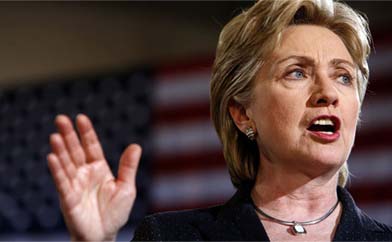|
Secretary of State Hillary Clinton plans to rule on whether to remove an Iranian dissident group from a U.S. terrorism blacklist about two months after its refugee camp in Iraq closes, the Obama administration said on Tuesday. |
 The U.S. Court of Appeals for the District of Columbia Circuit heard arguments on a petition from the group, Mujahadin-e Khalq, or MEK, which is seeking an order forcing the State Department to either remove it from the list or require action within a specified period on its request to be delisted.
The U.S. Court of Appeals for the District of Columbia Circuit heard arguments on a petition from the group, Mujahadin-e Khalq, or MEK, which is seeking an order forcing the State Department to either remove it from the list or require action within a specified period on its request to be delisted.
Iranians who belong to the group have been moving out of its Camp Ashraf base in Iraq to a processing center at a former U.S. military base in Baghdad, and the remaining 1,200 or so are expected to be moved in the next nine weeks or so, the administration said.
Clinton plans to decide on the group's request to be delisted from the U.S. Foreign Terrorist Organization list "no later than 60 days after the last move," Robert Loeb, a Justice Department lawyer representing the administration, told the appeals court that heard oral arguments on the issue.
It appeared to be the first time that the State Department had publicly given a rough timeline for making a decision on the matter.
Loeb acknowledged that a 60-day period for a decision "may not be realistic" because they could find additional evidence that needs to be weighed, but that Clinton had authorized him to tell the court of her plan.
Loeb said the administration has been carefully weighing whether the group has fully renounced its violent past and given up any weapons. He denied that the process was without an end. Clinton said in February the camp move was a "key factor" to making a decision.
"We're not citing world peace" as a goal to determine the fate of the designation, Loeb said.
Also known as the People's Mujahideen Organization of Iran, the group led a guerrilla campaign against the U.S.-backed Shah of Iran during the 1970s that included attacks on U.S. targets. It was added to the list in 1997, but the group has said that it has renounced violence.
UNWELCOME IN IRAQ
The group, which has pushed for the overthrow of Iran's clerical leaders, found itself no longer welcome in Iraq under its new Shi'ite-led government that came to power after Saddam Hussein's downfall in 2003.
As a result of the MEK's listing as a foreign terrorist organization, Americans are barred from supporting the group, and its members or representatives are banned from entering the United States.
A lawyer for the group, Viet Dinh, pressed a three-judge appeals court panel to force the Obama administration's hand and said that the terrorism designation has "severe implications on constitutional liberties" for the group.
He denied that the MEK members at the base were armed and saying that "the group for a decade has renounced violence."
The three judges appeared skeptical of both sides during the arguments, acknowledging that it was not as if the Obama administration was "sitting on their hands", as Judge Karen LeCraft Henderson put it during the nearly hour-long arguments.
Judge David Tatel raised the possibility of establishing a deadline for when Clinton must rule or take the Obama administration's backup suggestion to require regular progress reports to the court.
But he questioned whether the group wanted a decision that could go against the group now but in a few weeks or months could be reversed.
Dinh argued that the law required Clinton to make a decision within short order and that the group wanted a decision made even if it was not to delist it because then it could appeal it in the courts. "Any decision would be better," he said.
Tatel also pressed Loeb on why the administration just did not deny the application so the appeals process could move, but the lawyer said that the situation was "fluid" and did not want to risk hurting cooperation to close Camp Ashraf.
